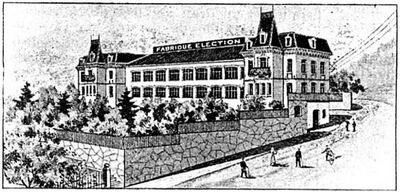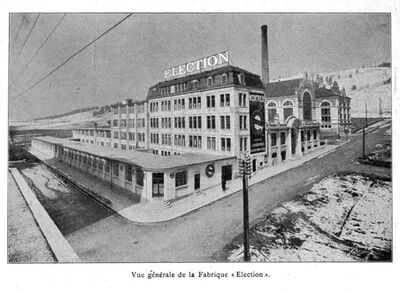Election
Election was a historic Swiss watch brand active from 1848 through the 1980s. Founded by the Braunschweig family of Hamburg, the Election brand debuted in 1904 and was the leading La Chaux-de-Fonds factory until bankruptcy in 1931. It was re-formed as Nouvelle Election the following year and lasted through 1987 when it was renamed Douest.
Braunschweig in La Chaux-de-Fonds
In the 1950s, Election traced its roots to 1848 in La Chaux-de-Fonds, but this is not precise. The company can trace directly back to Lazare Lucien Braunschweig (1819-1899), who worked as a watchmaker in the area, but it was his brother, Alphonse Braunschweig, who first established himself as a watchmaker.
Alphonse is listed as A. Braunschweig, a watchmaker in Le Locle as early as 1854. Indicateur Davoine shows "Abm. Branschveigt" at Grande Rue 89 that year, correcting this to "A. Braunschweig" on Rue des Fontaines 198 in 1855 and 1856. Braunschweig moved to La Chaux-de-Fonds, on Rue de la Serre, by 1860, and perhaps as early as 1859, when "H. Braunschweig" is shown at number 20. The following year we see "A. Braunschweig" at 18, moving back to number 20 in 1861 and 22 in 1875. This would be the permanent address of Braunschweig and Election through 1904. Other members of the Braunschweig family worked there as well, including J. Braunschweig & Cie (at Serre 25) which produced watches for the American market and Braunschweig & Hirsch.
It is likely that Lazare worked with Alphonse in La Chaux-de-Fonds, and it was Lazare's son Alphonse "Alvi" Braunschweig (1855-1906) who would continue the family watchmaking firm. He could be the "Braunschweig et Levaillant" listed at Rue de la Serre in 1877 and Rue Léopold Robert 55 in 1879. Lazare is specifically listed in 1883 and Braunschweig et Levaillant is no longer. We first encounter Les Fils de L. Braunschweig in 1886, and this was certainly Alvi's firm.
Alvi's son Arnold (1884-1918) took over the company but died of Spanish Flu. His brothers Lucien (1885-1958) and Georges (1892-1975) would continue to be involved in the company and would retain this name for decades.
Lucien would be quite active and well known in La Chaux-de-Fonds and continued the work of his father at Rue de la Serre 22 before relocating the company to a new facility in the Eplatures district on the road to Le Locle in 1905. This coincided with a joint venture with A. Braunschweig & Cie of Hambourg (perhaps his brother Arnold or uncle Alphonse), likely with more investment and rapid expansion.
Lucien Braunschweig took a lead role after his brother died in 1918 of Spanish Flu. Later, Georges Braunschweig would become President of Universal Escapement/Portescap, manufacturer of Incabloc, which he founded in 1931 along with Election manager Fritz Marti.
Fabrique Election

Lucien Braunschweig appears to have joined forces with a relative from Germany to expand his company in the 1900s, as Swiss production of watches was ramping up. Braunschweig planned to build a large factory to on the plain West of La Chaux-de-Fonds to implement the "American system" of mass mechanized production. Ironically, he first set up shop producing Election brand watches at the Montbrillant Watch Manufactory alongside Léon Breitling and Couleru-Meuri. Charles Couleru-Meuri was an outspoken critic of mass production, preferring the old system of hand work, and this must have been a point of contention between them.
Election's 1904 launch featured the iconic image of the Montbrillant factory with an imagined "Fabrique Election" sign on the roof, just as Breitling and Couleru-Meuri did in their own ads featuring the building. The company offered high-quality thin pocket watches with movements measuring 3 or 4 mm thick and fine regulation. Notably, Election included an integrated crown setting system that dispensed with the pin or lever used on other watches.

The Election factory was to be built at the end of Rue de la Paix directly west of La Chaux-de-Fonds near the Eplatures headquarters of the factory. Election had begun construction by February 1904 with a planned opening of 1905, by which time 250 workers would be needed. The factory expanded rapidly in the 1910s, with an additional low-rise workshop area added to the south by 1918 and additional buildings constructed to the north and west by 1924. Soon Election was one of the largest watch manufacturers in La Chaux-de-Fonds. Lucien Braunschweig was part of the School of Commerce and Swiss Watch Chamber of Commerce during this period.
The Great Depression hurt Election earlier than many other Swiss companies. By mid 1930 the massive factory was on the brink of bankruptcy. Some patents were reassigned to the banks and the company and all its assets were put up for sale. With no buyer, by December, Lucien Braunschweig, his brother Georges and son Paul faced administrative action and bankruptcy. Les Fils de L. Braunschweig, Fabrique Election, officially closed on November 2, 1931 and was ordered to be liquidated.
Nouvelle Election
With Election bankrupt, the Braunschweig family began raising funding to re-start. In 1931 the family created a new company, Nouvelle SA des Montres Election and this group purchased the Election brand by April 1931. Seeing no buyers even in liquidation, Nouvelle Election purchased many of the assets of the old and continued the activities in the same factory and with many of the same patents and products. At this same time, Georges Braunschweig and Election manager Fritz Marti founded Portescap to produce escapements and shock protectors. This firm was located across the street from Election and remains at this location today.
In 1930, a second company, Société Anonyme pour la Vente des Montres Election (S. A. V. E.) was formed in Geneva to continue the distribution of Election branded watches. With the Election brand revived as Nouvelle Election, this company lost access to the name and was renamed "SAVE" in 1938.
The revived company was able to regain some market share in the 1930s, and in the 1940s followed the branding trend. Nouvelle Fabrique Election SA produced watches under the Electron, Selection, and Grand Prix brands as well as Election. The Grand Prix brand lasted through the 1950s and was almost as well-known as the primary Election brand. Another brand, Elictrion was not as popular.
By 1945, René Didisheim became President, with Lucien Braunschweig taking the role of Secretary. Lucien Braunschweig died on July 11, 1958 at the age of 73. He had lead Election and Nouvelle Election for over 50 years and was greatly involved in La Chaux-de-Fonds commercial activities as well.
Election was among the companies adopting the ultrasonic cleaning and hermetically sealed case trend of the 1950s. After 1955, Election watches were produced using this method. Through the 1950s, Election was well known for the Grand Prix, and this was featured on many of their watches. The company was well represented in Asia and Latin America, where it was often partnered with Girard-Perregaux. One notable advertisement in the 1950s called attention to an Election Grand Prix watch that was carried by the crew of the raft Tahiti Nui, similar to Eterna's Kon Tiki.
In the 1960s, Election emphasized their high-jewel watches. The Supermatic 41 had a 41-jewel movement with date and central seconds. Other model names used in the 1950s included Tropical Special, Electrovar, Gold Hood, Everlast, Timelight, Connoisseur, Evergreen, Ocean King, Everbest, Super-Electron, Carrier, Electrion, and Superdate de Luxe.
Election was unable to compete in the 1970s, however. Most of the company's trade marks expired during the decade as they fell into disuse, including Grand Prix and Supermatic. Others, like Vymo, Electron, and Desport, lasted into the 1980s. The company remained in business through the 1980s, relocating to a small office at Rue du Doubs 93 in 1983. The company was renamed Douest SA in 1987 and disappeared soon after.
Election and Marvin
Election worked closely with Marvin in the post-war period, and the two companies share some watch movements. For example, Election's Cal. 875 became Marvin's Cal. 700 in the 1960s, and this was later also used by Longines as Cal. 490. Similarly, Marvin's rectangular Cal. 160 became Election's Cal. 275.
Although it is widely claimed that Election was purchased by Marvin in 1950. The companies were located next door to each other, Election at Rue Numa-Droz 142 and Marvin at 144-146, but Tavannes was on the other side at 134-138 and these three companies had been neighbors since the 1930s. It is unclear what the relationship between these companies was. There is no documentation of ownership of Election by Marvin or of Election being part of the MSR group.